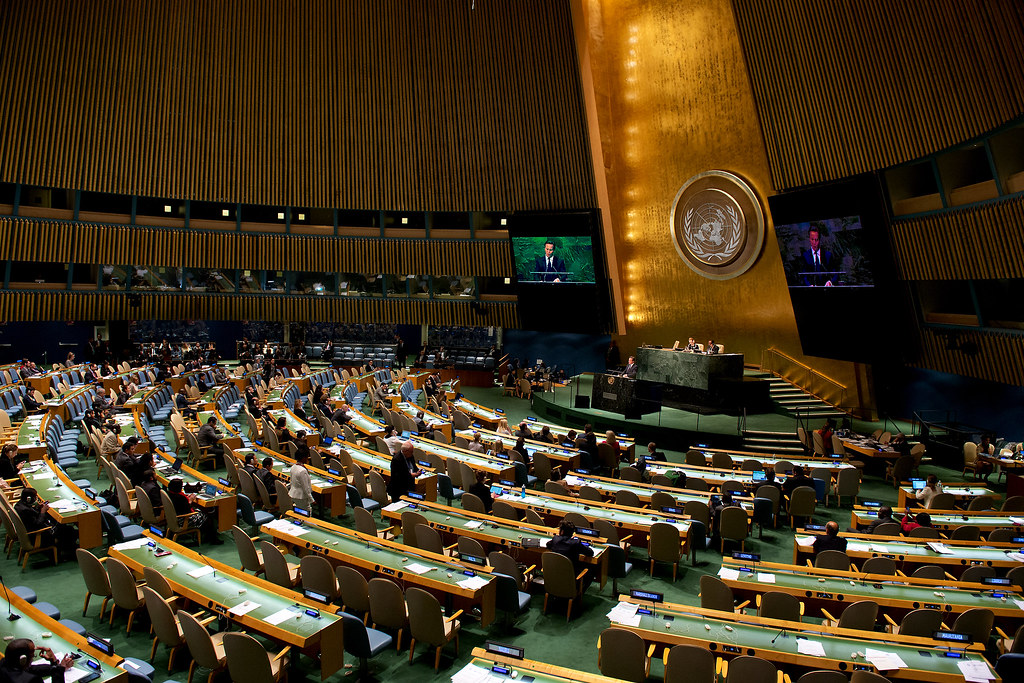The UN General Assembly has long been criticized as a platform for heads of state to make empty promises and receive applause from fellow delegates. The week of intended multilateralism may bore fewer tangible outcomes than imagined, but it still grants a platform for delegates to reach a worldwide audience, including those who rarely get that opportunity.
As well as a diplomatic venue and a platform, “UNGA week” is a spectacle. The city I live in is disturbed by hundreds of world leaders requiring street closures and police escorts. If you ask any taxi driver, New Yorkers hate it. Across the river from my apartment, the UN headquarters is heavily secured and roads are blocked, but important conversations are happening. UNGA provides heads of state and other decision-makers a chance to meet in person and try to hash out major issues that plague our world.
The hundreds of sideline events provide additional opportunities for much-needed conversation. The organization I work for had one to raise awareness and funds for our new refugee Family Reunification Initiative. Then there’s the UNGA-adjacent climate week, along with dozens of other events hosted by businesses and organizations.
This year at UNGA, there was a focus on the halfway point of the SDG Goals timeline. Many leaders accurately pointed out that we’re nowhere near meeting most of these goals by 2030. Those leaders included the Prime Minister of Barbados, Mia Amor Mottley. When Mottley addressed the UN General Assembly, there were more empty seats in the chamber than full ones. Her 23-minute-long call to action had a far smaller in-person audience than those in the limelight; Zolensky’s for example. Though today, in-person listeners are but a second thought in UNGA addresses. Live streaming opens up the discussions for the world to hear and YouTube was one of, if not the most preferred channels to view the event.
Mottley’s address has had over 240,000 views since streaming live on September 22nd. At the time of writing this, there were 544 comments, made from around the world, by members of the Caribbean diaspora and many more. Rather than relying on cable television, anyone in the world can tune in on their smartphone, increasing access and opening up the conversation.
Though it’s important to note, as The New Humanitarian pointed out, Global South citizens are often denied the stage in events like UNGA. While attendees from Europe, Australia, and elsewhere usually have no issues flying into New York for UNGA, strict visa laws prevent many others from joining, and the voices of those most affected by the crises this event is intended to address are silenced.
Luckily, we did hear from Mottley, who has become an outspoken voice on international debt reform and its relation to the climate crisis and development. Early on in her speech, she asks,
“Are we going to trod the roads, only to be told that it’s too late? Too late for us to save as many as we can from the climate crisis. Too late for us to save as many as we can from the conflicts of war… Are we going to be too late for the SDG’s, that are really the promise of development.”
Referencing the Bridgetown Initiative, which Mottley and her government wrote and championed, she called for rethinking the funding of development. She mentions the situations in Haiti, Cuba, and Venezuela to highlight the need for debt reform. Their economies, like many others in the global south, are crippled by rising government debt and unsustainable interest rates.
The forever indebtedness that so many countries are in keeps their people and economy reliant on the aid system, unable to protect themselves and recover from disasters, and more susceptible to climate change. This insurmountable debt keeps many southern countries from internally developing their economy, and trapped in a system reliant on NGOs and donor countries.
Mottley boldly calls out the United States, the IMF, and the World Bank, for creating and upholding these predatory debt systems that inhibit countries from developing social and economic systems that would allow them to endure inevitable crises. Among other things, The Bridgetown Initiative demands that high-interest surcharges be temporarily suspended for developing countries, use the $100 billion Special Drawing Right currency reserve for climate resiliency programs, and use economic tools to encourage private sector investment in low-income countries to transition to a low-carbon economy.
For those watching and listening around the world, she points out that these demands and other preventative initiatives are entirely possible and will determine whether developing countries and small island nations will survive the climate crises. The question is whether other member states will decide to support climate resiliency.
“What is the issue is whether we can summon the determination that is required of us to make the changes that are appropriate to the age of which we live.”
During the 78th session of the UN General Assembly, Mia Amor Mottley’s address confirmed that this dinosaur of an event still has relevance within the international development community.


